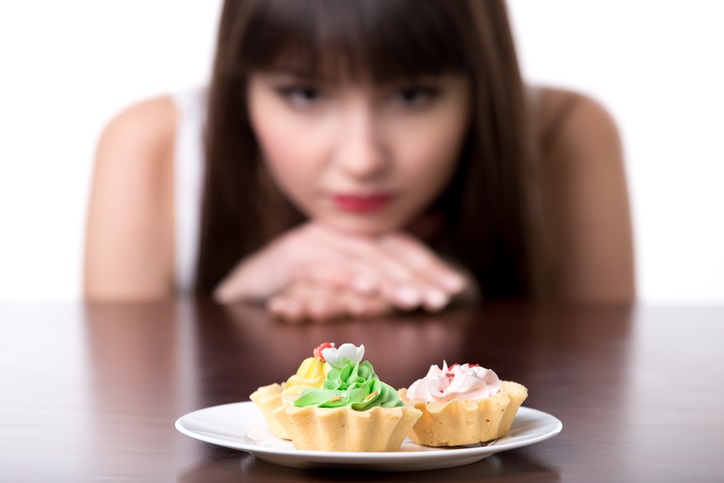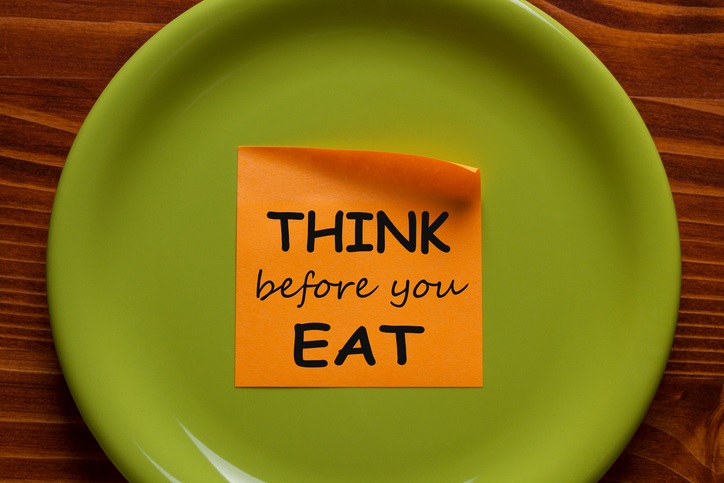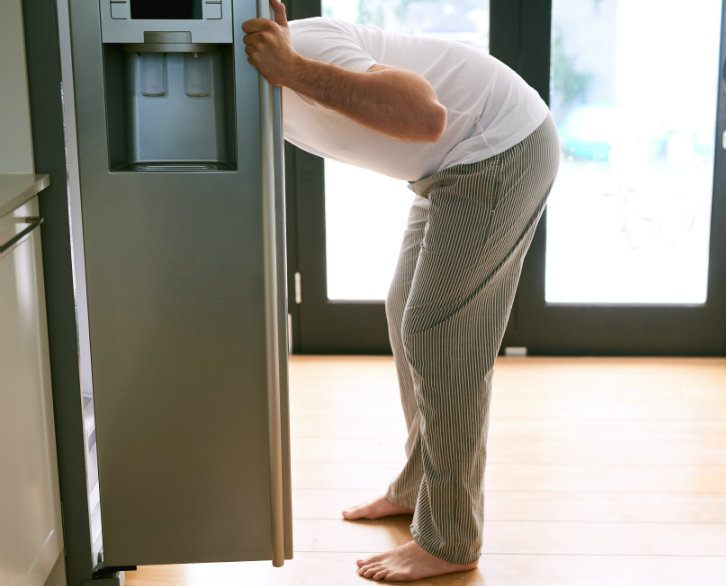
Grabbing a cookie from the staff kitchen when you’re bored at work, indulging in a pint of ice cream (or two) after a breakup, mindlessly inhaling a bag of potato chips when you’re stressed—these are all-too-common examples of emotional eating. Scientific research shows stress can cause compulsive eating behaviors, which can lead to obesity. Emotional triggers ranging from depression to euphoria can cause people to increase their food intake or make poor nutritional choices.
A Harris Poll of more than 2,000 American adults found nearly 80 percent of women and 70 percent of men suffer from “food guilt,” or associating fear with food choices, as a result of using food to meet mental and spiritual needs. The American Psychological Association reports 38 percent of adults have overeaten or eaten unhealthy foods due to stress in the past month, and of those adults, nearly half repeat those behaviors weekly or more.
If you are an emotional eater, you’re not alone. Most people have let their emotions dictate their food choices at some point. Here are some signs of emotional eating, how to cope with it, and resources for help.
Signs of Emotional Eating

If any of the following behaviors are familiar to you, you may be experiencing signs of emotional eating:
- You eat more when you are stressed or experience a strong emotion such as sadness, anger, anxiety or boredom.
- You eat even though you are not hungry.
- You use food as a reward or punishment.
- You eat to improve your mood.
- You view food in a similar way as you do a comforting friend.
- You feel like your eating is out of control.
Any time you eat for a reason other than satisfying hunger, you may be eating due to emotional reasons.
Causes of Emotional Eating

As a psychologist explains in Psychology Today, emotional eating may be due to:
- Unconscious eating, which is when someone eats without focusing on the food or why they’re eating.
- Opioid release, which occurs after eating sugars and fats and which produces an addictive, calming and soothing effect.
- Resistance to difficult feelings, such as wanting to avoid feeling sad, angry or bored.
- Body shame, where people feel negative about their body and eat because of those feelings.
- Hunger and tiredness, which can hinder the ability to make smart food choices.
Eating food is often a pleasurable activity for most people. When we don’t feel our best, we may compensate with food to boost our moods. Unfortunately, this way of coping can lead to weight gain and life-threatening diseases like diabetes and heart disease.
Emotional eating can be cyclical. Eating based on emotions can exacerbate body hate, for example, which causes more eating and weight gain.
When you avoid emotional eating, you’re taking care of your mental health and your physical body.
Here are some ways to manage emotional eating.
How to Curb Emotional Eating
In response to the main causes of emotional eating, here are some strategies to stop the behavior.
1. Be mindful of what you eat

Avoid unconscious eating by focusing on just your meal while you’re eating. That means not watching TV, working or doing things on your smartphone. Make every meal a mindful one in which food is the focus.
You can also keep a food journal, so that you’re consciously writing down every food choice and getting a clear picture of everything you’re eating. Consider using an app for meal tracking, such as MyFitnessPal or Fitbit. These enable you to track your food intake and input common foods to see approximate calorie counts.
2. Do things that make you happy

If you are eating because you’re sad, stressed or bored, practice healthy activities that don’t involve eating. Some ideas include:
- Take a walk out in nature. Exercise releases feel-good endorphins.
- Indulge in a soothing bath or an at-home spa treatment. Make your own face mask or give yourself a pedicure.
- Do a puzzle or art project.
- Stretch or do yoga.
- Give yourself a head and eye temple massage.
- Play with your pet.
Activities that require your full focus can lead to “flow,” which psychologist Mihaly Csikszentmihalyi defines as a state of being that results in increased confidence, self-esteem, happiness and meaning. Flow is the type of feeling you get when you’re so completely immersed in an activity, time seems to pass by quickly because you’re enjoying yourself so much. It’s a much better state to be in compared to feelings of guilt from overeating.
3. Get in touch with your feelings

Because we often emotionally eat due to unpleasurable feelings, commit to recognizing negative feelings and observing them without trying to avoid them by eating.
Try tracking the times when you experience food cravings, and then note what emotions you’re feeling at those times. This way, you can see emotional eating patterns, and replace eating with healthier activities when those emotions pop up.
4. Practice body positivity

To break the emotional eating pattern, you must move toward viewing your body positively. The encouraging news is, as you move away from emotional eating, you’ll also start to reap the physical rewards, which reinforces a positive body view.
Some ways to appreciate your body include:
- Show gratitude for its capabilities.
- Write down what you like about yourself (they don’t have to be physical qualities), and read and add to your list often to boost your confidence.
- Surround yourself with positive people.
- Recognize the visual manipulations of advertisements and social media posts. Do not compare yourself to these unrealistic images.
- Help others. Making positive change in the world gets you out of your head and helps you feel good about yourself.
You may also benefit from talking with a therapist to improve your body image and overall self-esteem.
5. Take care of your body

When you practice healthy habits, you feel better, mind and body. This in turn helps you feel more in control of cravings. Be sure to:
- Get enough sleep.
- Eat small meals throughout the day to keep hunger at bay.
- Focus on eating whole, unprocessed foods, including lots of fresh fruits and vegetables.
Since hunger and a lack of sleep can contribute to poor decision-making, commit to a regular healthy eating and sleep schedule to keep your body at its best.
Local and National Resources for Emotional Eating
You don’t have to tackle emotional eating alone. There are many resources and support groups you can connect with for help, both in the Los Angeles area and across the nation.
Los Angeles-Area Resources and Support Groups for Emotional Eating
- Addictive Eaters Anonymous Los Angeles, support group
- The Bella Vita, free eating disorder support groups and 24/7 helpline: (818) 585-1775
- Eating Disorder Support for the Inland Empire, support groups
- Overeaters Anonymous, Los Angeles chapter
- Binge Eating Disorder Program, support groups
- Compulsive Eaters Anonymous, Los Angeles chapter
- Meetups: Weight Loss in Los Angeles, dozens of fitness and weight loss groups
- Men’s Compulsive Eating, a group for men to deal with the behaviors of compulsive eating
- Mindful Eating, mindful eating and behavioral strategies
- Weight Watchers Los Angeles, healthy lifestyle, diet and support groups
- YMCA of Metro Los Angeles Wellness Program, group exercise, personal training and nutrition advice
National Resources and Support Groups for Emotional Eating
- Eating Disorders Anonymous support groups, including online meetings
- Compulsive Eaters Anonymous – HOW, support groups, including phone help and in-person meetings
- IMAlive, live online chat network
- National Eating Disorders Association helpline: (800) 931-2237
- Overeaters Anonymous, meetings throughout the country
- Emotions Anonymous, online and in-person support groups to improve emotional well-being
- National Eating Disorders Association, support and counseling referrals
- The National Association for Males with Eating Disorders, support and information
- Recovery Warriors, support and recovery from eating disorders
- EmotionalEating.org, online support and information
- National Alliance on Mental Illness Connection Recovery Support Group, online message boards or peer-support groups
Get Weight Loss Help
For many, emotional eating is a coping technique that has been ingrained since childhood. If you live in the Los Angeles area and you’ve gained excessive weight due to emotional eating, Soma Weight Loss may be able to help. Weight loss surgery can help get your cravings under control and give you back your life.


![Which Diet is Best for Weight Loss? [Infographic]](https://www.somabariatrics.com/wp-content/uploads/2019/10/burger-and-fries-vs-green-salad-best-diet-for-weight-loss.jpg)

